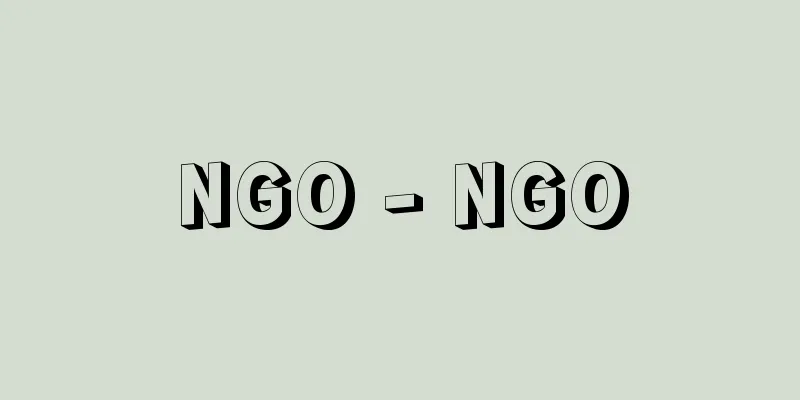NGO - NGO

|
Abbreviation for Non-Governmental Organization. Originally, it was a term specified in Article 71 of the United Nations Charter, and referred to a private organization that has consultative status with the UN Economic and Social Council. Its basic characteristics are that it is a private organization independent of governments (non-governmental), that its composition and activities have international aims (international), and that, unlike multinational corporations, it does not aim at profit or distribute profits (non-profit). In accordance with these criteria, various non-profit organizations such as business associations, social welfare organizations, religious organizations, consumer groups, women's groups, and labor groups are registered as NGOs with the UN (see UN NGOs). However, today, any citizen-led organization that is working to solve problems from a global perspective in a non-governmental and non-profit capacity, regardless of the UN, is generally referred to as an NGO. It is said that the seeds of NGOs seen internationally can be found in the charitable activities of Christian churches during the colonial era. Following the founding of the World YMCA Union in 1855 and the Committee of Five (later the International Committee of the Red Cross) in 1863, many civic groups were formed between World War I and World War II to provide relief to disaster victims, refugees, orphans, and missing people, and to rebuild cities. After the war, especially in the 1960s, many independent countries were established in Asia and Africa, and these NGOs shifted their focus from Europe to developing countries. In the 1970s, NGOs aimed at the independence of residents in Asia, Africa, and Latin America, which were later called Southern NGOs, began to operate in these areas. In Japan, non-profit activities by private citizens before the war were limited to nursing the sick and injured and social welfare, and were characterized as playing a supporting role to the government. After the war, many residents' and civic groups were formed amid the development of the labor movement, consumer movement, anti-nuclear and peace movement, and anti-pollution movement, which later became the basis for NGOs in the fields of the environment and human rights. In the 1960s, organizations tackling development issues in Asia began to be established, and the term NGO also became established in Japan with the outflow of Indochinese refugees in the 1980s and the formation of citizen groups to address this. Following the 1995 Great Hanshin-Awaji Earthquake, the NPO Law was enacted in 1998 to give citizen groups corporate status as NPOs as a system for fostering stronger citizen-led non-profit organizations (see NPO section). Depending on their field of activity, NGOs may be classified as human rights NGOs, development NGOs, disarmament NGOs, environmental NGOs, etc. Related topics Amnesty International | Sustainable Netherlands Action Plan | Oxfam | ODA | International Physicians for the Prevention of Nuclear War | International Union for Conservation of Nature | International Commission of Jurists | International Public Opinion | United Nations | United Nations Development Programme | United Nations Human Rights Centre | United Nations World Conference on Human Rights | Disabled People International | Landmines | Human Rights Subcommittee | Convention on the Prohibition of Anti-Personnel Mines | Davos | Global Environment Fund | Pan-Indian Movement | International Campaign Against Racism | Human Rights Watch | Worldwatch Institute Source : Heibonsha Encyclopedia About MyPedia Information |
|
Non-Governmental Organizationの略称。本来は,国際連合憲章第71条に明記された用語で,国連の経済社会理事会に対し,協議資格を持つ民間団体を指す。その基本的特徴は,政府から独立した私的団体であること(非政府性),その構成や活動の目的が国際的であること(国際性),多国籍企業と異なり営利を目的あるいは配分しないこと(非営利性)などである。国連には,こうした基準に従って,経営者団体,社会福祉団体,宗教団体,消費者団体,女性団体,労働団体などの多様な非営利組織がNGOとして登録されている(国連NGOの項を参照)。しかし,今日では,国連に関係なく,地球的視野の問題解決に非政府・非営利の立場で取り組んでいる市民主導の組織を一般にNGOと総称している。国際的に見るNGOの萌芽は,植民地獲得時代のキリスト教会による慈善活動だといわれる。1855年の世界YMCA同盟や1863年の5人委員会(後の赤十字国際委員会)の結成を経て,第1次大戦から第2次大戦を契機に,被災者・難民・孤児・行方不明者の救援活動や都市の復興活動に取り組む市民団体が数多く誕生した。戦後,特に1960年代にアジア,アフリカで多くの独立国が誕生すると,こうしたNGOが活動の対象をヨーロッパから発展途上国に移すことになった。また,1970年代には,活動対象であったアジア,アフリカ,ラテン・アメリカで,その後南のNGOと呼ばれる住民の自立を目指すNGOが活動を開始した。日本では,戦前の民間による非営利活動は傷病者の看護や社会福祉に限られ,政府の補助的役割を担うという性格が強かった。戦後は,労働運動,消費者運動,非核・平和運動,反公害運動が展開される中で,多くの住民団体や市民団体が結成され,後の環境や人権分野でのNGOの基礎となった。1960年代に入るとアジア地域の開発問題に取り組む団体が設立されるようになり,1980年代のインドシナ難民の流出とこれに取り組む市民団体の結成を契機に,日本でもNGOという言葉が定着するようになった。1995年の兵庫県南部地震(阪神・淡路大震災)を経て,より強固な市民主導の非営利組織を育成するための制度として,1998年,市民団体にNPOとしての法人格を与えるNPO法が成立した(NPOの項参照)。活動の分野により,人権NGO,開発NGO,軍縮NGO,環境NGOなどと分類されることがある。 →関連項目アムネスティ・インターナショナル|永続可能なオランダ・アクションプラン|オックスファム|ODA|核戦争防止国際医師会議|国際自然保護連合|国際法律家委員会|国際世論|国際連合|国連開発計画|国連人権センター|国連世界人権会議|障害者インターナショナル|地雷|人権小委員会|対人地雷全面禁止条約|ダボス会議|地球環境基金|パン・インディアン運動|反差別国際運動|ヒューマン・ライツ・ウォッチ|ワールドウォッチ研究所 出典 株式会社平凡社百科事典マイペディアについて 情報 |
<<: NGC Catalogue - New General Catalogue of Nebulae and Clusters of Stars
>>: Enugu - Enugu (English spelling)
Recommend
Test Competition - Genkurabe
Monks and ascetics split into two groups, left and...
Brewery - Kuramoto
During the Edo period, the person who managed the ...
The tune of thread
Jiuta utahon. Among the utahon from Osaka after th...
Targums
…The oldest extant manuscripts date from the 11th...
studio work
…Making replicas of the master's works was al...
Inhibitors
Also called an inhibitor or inhibitory substance. ...
Stereo Projection - Stereo Projection
A point on a sphere is used as a viewpoint, and a ...
Columnar epithelium
When epithelial cells are classified by morpholog...
Automotive industry - Automotive industry
A division of the transportation machinery industr...
Opening the Column
〘 noun 〙 To write down or start writing. ※Internat...
Inkjet printer
...In a computer, the device that takes in inform...
Melville [island] - Melville
An island belonging to the Parry Islands in the Ca...
Dubai (English spelling)
Also spelled Dubai. One of the emirates that make ...
Asking for sake - Ukezake
〘 noun 〙 Purchasing sake from a sake brewer and se...
Amber - Amber
Fossilized plant resin. Known from the Jurassic to...









